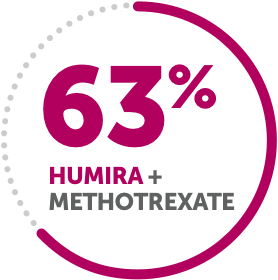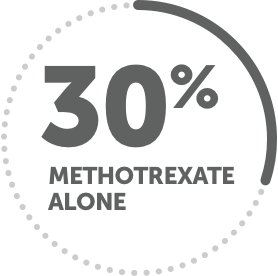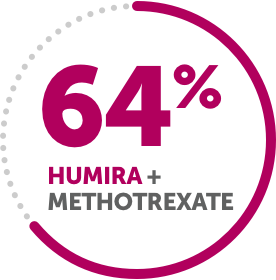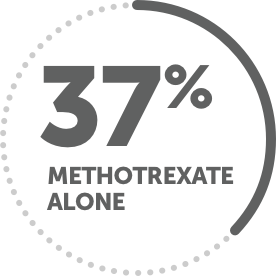HUMIRA for Moderate to Severe Rheumatoid Arthritis (RA)
HUMIRA for Moderate to Severe Rheumatoid Arthritis (RA)
What is HUMIRA?
HUMIRA is a prescription medicine used alone, with methotrexate, or with certain other medicines to reduce the signs and symptoms of moderate to severe rheumatoid arthritis (RA) in adults, may prevent further damage to your bones and joints, and may help your ability to perform daily activities.
HUMIRA Results for Rheumatoid Arthritis
In a study of moderate to severe RA patients diagnosed for an average of 11 years who added HUMIRA to methotrexate.
People with RA signs and symptoms who saw improvement


When compared with methotrexate alone in a clinical study, more people taking HUMIRA and methotrexate saw a 20% improvement in the signs and symptoms of RA at 6 months.
In a separate study of patients with moderate to severe RA (diagnosed for less than 3 years and not previously treated with methotrexate).
People with no further joint damage as seen on X-ray 1 year after treatment


Individual results may vary.
Common side effects of HUMIRA
Common side effects of HUMIRA include injection site reactions (pain, redness, rash, swelling, itching, or bruising), upper respiratory infections (sinus infections), headaches, rash, and nausea. These are not all of the possible side effects with HUMIRA. Tell your doctor if you have any side effect that bothers you or that does not go away.
Read about the Important Safety Information for HUMIRA.

HUMIRA Dosing for Rheumatoid Arthritis
It’s important to use proper injection technique and follow the dosing schedule for your treatment with HUMIRA.
The recommended dose is 40 mg every other week.
Some patients not taking methotrexate may benefit from increasing the dosage of HUMIRA to 40 mg every week or 80 mg every other week. Always follow your doctor's instructions about when and how often to take HUMIRA.*
HUMIRA is given by an injection under the skin.
Your first dose must be given under the supervision of a health care professional. Make sure you have been shown how to inject HUMIRA before you do it yourself. If your doctor determines that it's ok, HUMIRA can be taken at home. Remember to keep your HUMIRA refrigerated in its original container until ready for use.
You should continue taking HUMIRA as directed by your doctor. Remember, HUMIRA is a treatment, not a cure. Your doctor can tell you if and when you should stop taking HUMIRA.
For more information, refer to the Patient Instructions for Use and the Medication Guide located inside the HUMIRA carton, and within the Full Prescribing Information. If you experience any adverse reactions or discomfort when taking HUMIRA, discuss them with your doctor right away.
*Refer to the Patient Instructions for Use to learn about the HUMIRA Pen and prefilled syringe.

Start with support that’s designed around you
HUMIRA Complete gives you access to potential savings, injection training guides, and other helpful resources. Plus, you’re a phone call away from getting help with insurance coverage support.

How does HUMIRA work?
The protein TNF-alpha is believed to be part of your body’s natural processes involved in creating inflammation, and in some cases, excess inflammation. When used as prescribed, HUMIRA targets and blocks TNF-alpha, which plays an important role in the inflammation and potential development of permanent joint damage associated with moderate to severe RA.
Explore a different rheumatoid arthritis treatment option.
Learn about a once-daily pill for adults with moderate to severe rheumatoid arthritis who have already tried a TNF blocker like HUMIRA.

